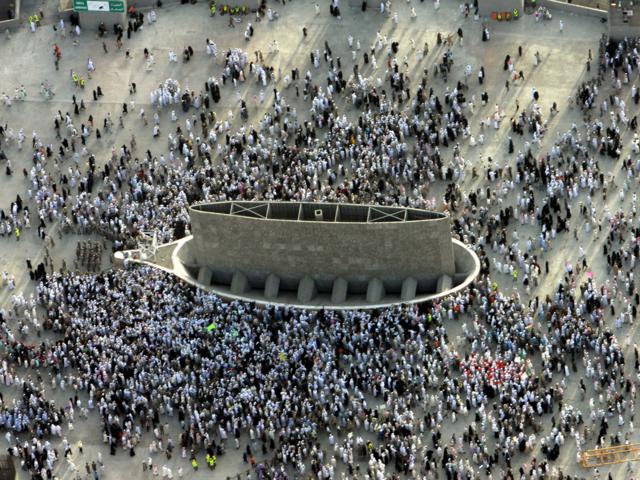ماهي قصة رمي الجمرات في الحج ؟

وجاء في فتوى لابن باز، مفتي المملكة العربية السابق، على موقعة الرسمي “على المسلم طاعة الرسول صلى الله عليه وسلم واتباع الشرع، وإن لم يعرف الحكمة، فالله أمرنا أن نتبع ما جاء به الرسول صلى الله عليه وسلم وأن نتبع كتابه”.
وأضاف ابن باز: “إن الله جل وعلا وله الحكمة البالغة والحجة الدامغة شرع للمسلمين رمي الجمار في الحج، تأسياً بنبيهم لأنه لما حج حجة الوداع رمى الجمار يوم العيد، بسبع حصوات رمى جمرة العقبة فقط، يعني الجمرة التي تلي مكة، بسبع حصوات يكبر مع كل حصاة، ثم رمى الجمار في الأيام الأخيرة، في الحادي عشر والثاني عشر والثالث عشر، رماها بعد الزوال، كل واحدة رماها بسبع حصوات، يكبر مع كل حصاة، ويقول -عليه الصلاة والسلام- عند أداء المناسك : (خذوا عني مناسككم)، يعني يأمر الأمة أن يتعلموا منه، وأن يعملوا بما يشاهدوا من عمله -عليه الصلاة والسلام- وما يسمعون من قوله، فهذا هو الدليل على رمي الجمار، وهي تشتمل على سبعين حصاة، لمن استكمل الرمي في الأيام الأربعة فرمى يوم العيد سبع حصوات بعد ارتفاع الشمس إلى غروب الشمس كله محل رمي يكبر مع كل حصاة لرمي الجمرة الكبرى التي تلي مكة، وهي جمرة العقبة، وإن رماها في الليل بعد نصف الليل أجزأ ذلك، ولا سيما للضعفاء والعجزة، أما الأقوياء فالسنة لهم أن يكون رميهم مثلما رماها النبي – صلى الله عليه وسلم – بعد ارتفاع الشمس ضحى، وإن رماها بعد الظهر أو بعد العصر فلا حرج، ويجوز على الصحيح، أن يرمي بعد الغروب – أيضا – تلك الليلة لمن لم يرم في النهار، إلى آخر الليل. وأما الأيام الأخرى الثلاثة وهي أيام التشريق فإنها ترمى بعد الزوال، كما رماها النبي – عليه الصلاة والسلام- ولا يجوز رميها قبل الزوال؛ لأن ذلك خلاف الشرع المطهر، ويرميها المسلمون بعد الزوال إلى غروب الشمس، ومن لم يتيسر له ذلك، من عجز عن ذلك أو شغل عن ذلك، جاز رميه لها بعد الغروب تلك الليلة في اليوم الذي غربت شمسه في أصح قولي العلماء؛ لأنها حالة حاجة وضرورة ولا سيما عند كثرة الحجيج، فإن الوقت لا يسع لهم ما بين الزوال إلى غروب الشمس، ولهذا جاز على الصحيح أن ترمى بعد غروب الشمس لمن لم يتيسر له الرمي بعد الزوال في ذلك اليوم، يعني اليوم الذي غابت شمسه يرمي فيه بعد الغروب، وقد ذكر جمع من أهل العلم أن الحكمة في ذلك إهانة الشيطان وإذلاله وإرغامه وإظهار مخالفته؛ لأنه عرض لإبراهيم – عليه الصلاة والسلام – حين أراه الله ذبح ابنه إسماعيل، ولكن من المقرر عند أئمة العلم أن الحكمة لا بد أن تكون بدليل واضح من كتاب أو سنة، فإن ثبتت فذلك نور على نور وخير إلى خير، وإلا فالمؤمن يتقبل شرع الله ويعمل به، وإن لم يدر الحكمة والعلة في ذلك، مع إيمانه بأن الله – سبحانه – حكيم عليم، كما قال -عز وجل-: إِنَّ رَبَّكَ حَكِيمٌ عَلِيمٌ [الأنعام: 83]، وقال -سبحانه-: إِنَّ اللَّهَ كَانَ عَلِيماً حَكِيماً [النساء: 11]، فهو عليم بما يشرعه لعباده عليم بما يقدره لهم، عليم بكل حادثة، في المستقبل، كما أنه عليم بكل ما يقع بكل ما وقع في الماضي، وله الحكمة البالغة في كل شيء – سبحانه وتعالى – فإنه له كمال العلم وكمال الحكمة والقدرة، فلا يفعل شيئاً عبثاً أبداً، فلا يشرع شيئاً عبثاً ولا يفعل شيئاً عبثاً – سبحانه وتعالى – بل كل ذلك لحكمة بالغة وعلة عظيمة وغاية محمودة، وإن لم يعلمها البشر، هذا هو الواجب على كل مؤمن أن يعتقد ذلك، فإن الله – سبحانه – هو الحكيم العليم فيما يقضيه ويقدره، وفيما يشرعه لعباده – سبحانه وتعالى -، ومن ذلك مسألة الرمي، رمي الجمار”.
ما هي أحكام رمي الجمرات الثلاث؟
في مِنى يرمي الحجاج الجمرات الثلاث اليوم والسنة أن يبدأ بالجمرة الصغرى، ثم الوسطى، ثم الكبرى “العقبة”، يرمي كل واحدة بسبع حصوات قائلاً مع كل رمية: “بسم الله، والله أكبر رغماً للشيطان وحزبه وإرضاءً للرحمن”.
ويدعو بعد كل جمرة ما عدا جمرة العقبة الكبرى، يرفع يديه مستقبلاً الكعبة ويصلي على النبي ويدعو بحاجته ويقول: “اللهم اجعله حجاً مبروراً وذنباً مغفوراً وعملاً صالحاً مقبولاً وتجارة لن تبور”.
ووقت الرمي من زوال الشمس “وقت الظهر” إلى طلوع فجر اليوم التالي ولكن السنة بين الزوال والغروب.
جمرة العقبة تُرمى بحيث يكون الحاج واقفاً مستقبل الجمرة، ويجعل مِنى عن يمينه وطريق مكة عن يساره. أما الرمي من فوق الجسر فمن أي جهة كانت. أما بالنسبة للجمرة الصغرى والوسطى فترمى من جميع الجهات.






